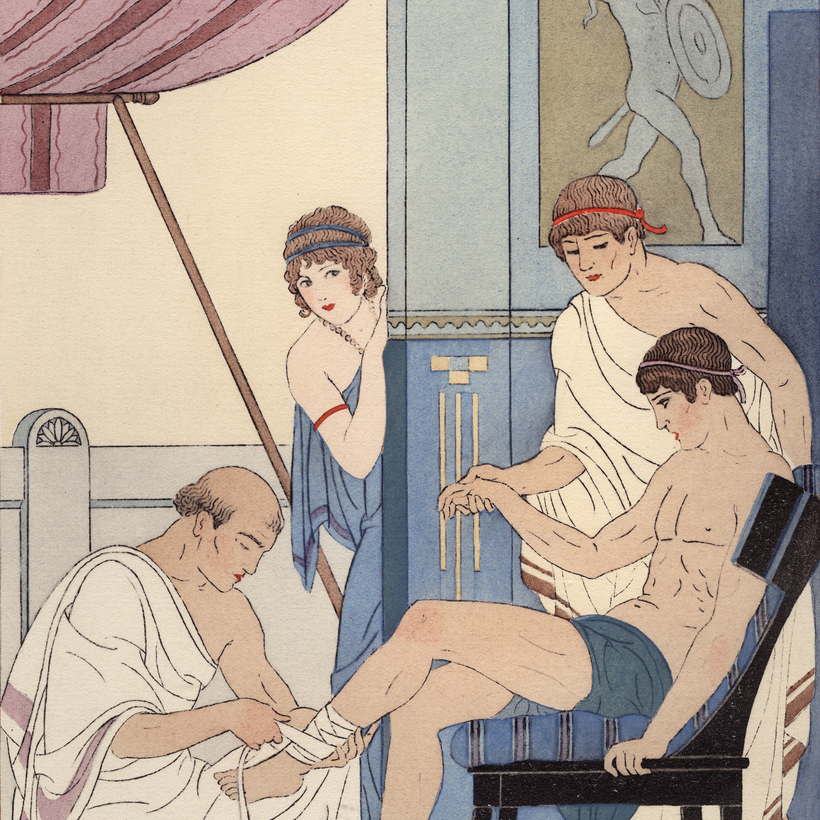Steve Hely’s 2009 novel, How I Became a Famous Novelist, contains perhaps my favorite made-up book title: Caesar, CEO: Business Secrets of the Ancient Romans. I like it not because it’s ridiculous—it is—but because it’s entirely plausible. (The boss of Hely’s narrator swears by it and refers to his business rival as “Carthage.”) Why do I mention this? Oxford classicist Robin Lane Fox’s The Invention of Medicine cries out for Helyan subtitling: “Ancient Wisdom for Wuhan”; “Viruses and ‘Vaccines’ in Fifth-Century Athens”; “Hippocrates and Herd Immunity.” (The imaginary publisher favors alliteration.) The actual subtitle, “From Homer to Hippocrates,” gives little away. The good news: Fox’s Invention of Medicine doesn’t strain for timeliness. The bad: there isn’t really any bad news—the book is intrinsically relevant and happened to be released mid-pandemic.
Fox’s “invention” is neither an old-timey set of remedies nor today’s advanced system of knowledge and practice. It is, instead, the conceptual shift from—beginning in the fifth century B.C.—the divine fatalism of Homer to the heightened empiricism of the medical (and historical) profession. (Indeed, this “broader wave of new thinking” in Greece also encompassed political philosophy, rhetoric, drama, and sculpture.) Case studies from, Fox argues, around 470 B.C., on the island-city of Thasos, were the marker.
The “invention” is neither an old-timey set of remedies nor today’s advanced system of knowledge and practice. It is, instead, the conceptual shift from divine fatalism to empiricism.
Galen, “the greatest doctor” of the second century A.D., reckoned Homer “the founder and patron of medicine.” The Iliad alone described roughly 300 wounds, nearly three-quarters of which proved to be fatal: “Hector hit him under the jaw and the ear, and the spear thrust out his teeth by the roots and cut through the middle of his tongue …” (Everyday aches and pains were, as Jacob Burckhardt noted, absent in epic: “We may well ask whether the ancients ever noticed a draught.”)
Yet no matter how vividly or accurately conveyed, Homeric afflictions—and their occasional cures—are, unhelpfully if rather fittingly, ascribed to the gods. As Fox points out in Travelling Heroes: Greeks and Their Myths in the Epic Age of Homer (2008), Homer’s source for the dynamic he projects between gods and men is essentially “sociological”: “The gods are aristocrats enlarged: they tend to treat mortals as aristocrats treat the lower classes.” That is to say, not unlike disease: pathologically, arbitrarily, and altogether poorly. Some 300 years later, an anonymous Thasian doctor-author contemplated the sick with an approach that rested not on received poetic convention but on “observation, humanity,” and, most importantly, “a belief that similar cases would recur and could then be knowledgeably treated.” The resulting so-called epidemic books are, if Fox’s re-dating is correct, “the first practical texts in the invention of medical science.”
The Invention of Medicine has pleasures for the classicist, medic, and lay reader. Fox’s repositioning of this Thasian breakthrough from the late fifth century B.C. (“in the age of Socrates and other great thinkers and writers whose rational methods of argument seem to be the natural context for their author’s thinking”) to the earlier part of the century will engage scholars, for the debate is an old one. Doctors may experience no small pride in the extraordinary impact they and their distant forbears have had on the quality and meaning of life. And for the rest, there is the fascinating evolution of an idea and, of course, the ancients’ mildly horrifying medical hypotheses.
An approach that rested not on received poetic convention but on “observation, humanity,” and, most importantly, “a belief that similar cases would recur and could then be knowledgeably treated.”
Herodotus relates an Egyptian tale about the purported healing power of, Fox writes, “a virtuous woman’s urine.” Alcmaeon, “an exceptionally interesting” contemporary of Herodotus’s, posited that semen was “part of the white marrow which was considered to be in the brain’s grey squashy mass”; during intercourse “semen passed from the male brain, ran down the spine, travelled round the testicles and rushed out through the penis.” Poor Alcmaeon gave semen too much credit. A Coan doctor at the Persian court, one Apollonides, fell in love with Princess Amytis and proposed sex (with himself, naturally) for her slight fever. The ending was anything but happy: Amytis did not survive Dr. Apollonides’s doubtful (even then) prescription, and he was buried alive.
Our starkest philosophical, and not strictly scientific, departure from the Greeks, however, is the modern mania for protracting life. In my undergraduate-admissions interview, I was given an unseen passage of verse—that is, one I couldn’t prepare for—to parse and discuss. Mine (“The woods decay, the woods decay and fall …”) was the half-familiar tale of the man given eternal life by his lover, Aurora, goddess of the dawn. The tragic upshot was that he lived, and continued to age, while Aurora remained unchanged.
I sweated my way through an acceptable commentary on the poem’s merits until blanking on the mortal’s name. Eventually, my interviewer spat it out (“Tithonus!”) with an outrage he must otherwise have reserved for pupils who turned up to his lessons drunk. I revisit this unfortunate, decidedly pretentious memory because the moral of Tithonus’s story was the acceptance of our span. Life is beautiful for its finiteness: “Of happy men that have the power to die …” The author of the epidemic books would have found the technological advances in anti-aging as mystifying as he would their animating compulsions. A century on, in The Republic, Plato’s archetypal doctors were said to believe that “if someone was naturally unhealthy, and leading a dissolute life, they regarded his life as of no value either to himself or to anyone else.” They were, in other words, budding insurers.
In another time and place, I might not have been so thoroughly moved by the Thasian doctor’s labors for the sake of posterity. Twenty-six of his 42 histories conclude with the patient’s death. “Why,” Fox asks, did he set down “so many cases which ended in death? They were hardly the most compelling advertisement for his craft, but they were recorded because they would help doctors in future whenever they confronted a similar sequence of signs and sufferings: they would know what was likely to come next, including death, and would be able to intervene or not accordingly.” He recorded suffering in order, with novel hope, courage, and anticipation, to one day prevent it.
Max Carter is the head of the Impressionist and Modern Art department at Christie’s New York


